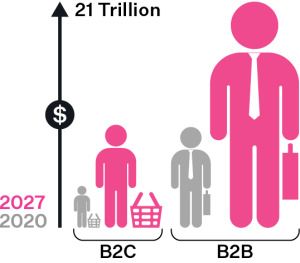When browsing the research and blog content of major industry analysts such as Forrester, McKinsey, Gartner etc. there are few topics this year that have attracted a similar amount of attention as the future of Business-To-Business (B2B) and its digitalization. The benefits when moving B2B commerce from traditional to digital environments are seen in all key business performance areas, i.e., revenue growth, cost saving, and improved experiences - both with customers as well as own employees. But these benefits are not always easy fruits to be picked. Rather B2B digitalization needs proper gearing up.
B2B Digital Commerce Is The Horse To Bet On
Many industries have identified B2B markets as a major source of revenue growth. And the winning horse to bet on is B2B digital commerce.
In fact, B2B online customer touchpoints and interactions are seen as top development challenge for 2022 (Digital Commerce 360), ahead of data management, and supply chain. And in our customer contacts we see B2B digitalization interest shared by both pure B2B players as well as those with a hybrid B2C-B2B business model:
-
Pure B2B: Businesses with an exclusive B2B business model (e.g., wholesalers, manufacturers, distributors) that look towards stronger digitalization of their existing customer interactions and processes.
-
Hybrid B2C-B2B: Businesses that may have an established consumer e-commerce solution (e.g., retailers) and now look towards upgrading their B2B commerce to the same level of digitalization - or expanding their existing B2C commercial scope into the B2B space by leveraging digital capabilities.
The B2B trend is underscored by significant investments from B2B Digital Commerce solution and platform providers, to match and fuel the market demand (e.g., Liferay, Adobe Commerce, BigCommerce, Shopify Plus).
Finally, it is important to note that B2B digitalization is not only about revenue growth. It is about strengthening the customer relationship and experience. And, currently particularly important, it is a major driver of operational efficiency.
B2B Outperforms B2C
European market growth predictions for B2B online commerce are above 10% over the next 3 years (International Trade Administration). Similar trends can be found for other developed economic regions, as well as for various products and services segments across industries. Some surveys among corporate leaders even report wide-spread B2B e-commerce growth expectations above 50% this year. However, apart from these predictions being made prior to current global turmoil, these are probably gross-growth estimates, i.e., part of the digital growth needs to be attributed to a transaction shift from non-digital to digital channels.
B2B digital commerce growth is generally believed to outperform that of B2C. One reason for this is that the B2B market value potential is estimated at two to three times the size of B2C. Also, B2C is already maturer and more saturated in terms of business implementation and user adoption of digital solutions.

Digital Experience As Key Differentiator
Because B2B digitalization has already entered many companies' the mainstream business agenda, the potentials for first-mover competitive advantages are rapidly diminishing. For instance Amazon launched its Amazon Business Marketplace in 2015, catapulting its revenue from a $1 to $10 Billion between 2016 and 2018 (Forbes, eMarketer). It's difficult to expect similar growth trajectories for many more companies in the years to come.
Nevertheless, the B2B eCommerce cake is large enough to serve many more hungry companies besides Amazon; who has so far cut out about a 2% slice in the US for itself (eMarketer). Most importantly, available B2B solutions are often still immature and deficient in the verdict of stakeholders. This allows for innovative companies to generate competitive overhand by offering better performing solutions.
B2B customers want to buy online ... but digital experience is not yet meeting their expectations:

In our view, the time window 2022-2024 offers a huge potential for B2B players to positively differentiate themselves and to generate profit by offering digital touchpoints and journeys that succeed in delivering the right level of operational effectivity and customer experience. Now is the right time to act.
Getting The B2B Digital Transformation Under Way
Among Solteq customers, an overwhelming number of businesses are reviewing their B2B strategy and business activities, incl. the digital experience (DX) they deliver to their enterprise clientele. Their key questions are how to develop their B2B business segment, especially how to respond to modern B2B business models, technologies and B2B customer expectations - potentially calling for a full rethink of the digital commerce infrastructure that enables their B2B business.
In particular our customers often ask where from to start their digitalization of B2B. We find that there is not one single recipe. Which phase in the B2B customer lifecycle, and exactly which types of use cases should first be addressed through features of a digital B2B solution depends on the nature and targets of company's business.
There are however a few key points about B2B digitalization, we wish to instantly highlight:
-
DIY experience: In 2021, B2B buyers' demand for digital transactions surpassed those of in-person selling (McKinsey). That is a significant, irreversible game change.
-
B2B ≠ B2C+: Addressing B2B and its digitalization is more than just adding a customer segment to an existing B2C solution.
-
B2B DX > B2B eShop: While selling is at the commercial core of business, digitalizing B2B is much more than just an online store for corporate customer. It is about building a digitally enhanced customer relationship, processes and data!
-
Configurability and Adaptability: B2B products and processes are complex and require more solution power for configurability and adaptability.
-
Technology: There are not many things that make a B2B stack unique (vs. a B2C stack). So, let's first not worry too much about technology.
-
Organization: Let's not underestimate the importance of having the right people with the right skillset to take the maximum power out of the digital B2B solution.
-
Beyond Revenue: B2B digitalization is not only about revenue growth. Currently particularly important, it is a major opportunity for streamlining operational processes in the quest for greater efficiency.
In sum, B2B deserves a bigger picture and ambition.
If you wish to dive deeper into the subject, feel free to download our eBook on the future of B2B: "Gearing Up For Digital B2B".







